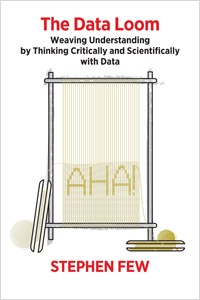Book Review - The Data Loom by Stephen Few

;TLDR A thought provoking book for seasoned analysts and business leaders that have slowly lost sight of their true purpose.
At just 122 pages The Data Loom by Stephen Few is succinct, to the point, and at times a bit blunt. For me this book added 4 books to my ‘Must Read’ list, and a few more that I’ll keep in mind for later. My main takeaway was to think about what I am doing when I am working with data. Not to tell a story around the data, but to extract the truth from the data.
The Recent emphasis on data storytelling has too often reduced data presentation to a cheap set of tricks. Learning from data is serious business. Presenting data in ways that are visually or narratively engaging is fine as long as they don’t compromise clarity and truth. We achieve clarity and communicate truth by focusing on primarily on substance, not on style.
– Stephen Few, The Data Loom
Early on Few establishes a framework of what data is, how it is important in everyone’s daily life, and how current trends in sexy data distract from data sensemaking, the main theme of the book. Frequently while I read I found myself stopping, gazing unfocused at the page, rolling through the possibilities of how I should have handled situations differently when dealing with data and data presentation. While I doubt anyone as ever claimed that my data analysis are ever flashy or sexy. I have fallen into the trap of using a tool, method or visualization simply because I recently read a blog post or tutorial on it. In the future I will reserve those for hobby projects.
Few touches on tools and going beyond just using tools.
Tools can’t do our thinking for us. No tools can provide or replace the skills that are needed to make sense of data. If we focus only on learning tools we will fail to develop the conceptual skills needed to use those tools effectively.
– Stephen Few, The Data Loom
So many parts of this book rang true to me, if I ran through them all I would be better served by just linking to the whole book. The ones that have stuck are the importance of Domain Knowledge, Critical Thinking, Systems Thinking and Statistical Thinking. Critical Thinking is not something I had thought about much since High School, while many classes and activities have danced around the methods of critical thinking, few have addressed it by those terms.
Who is this book for? It is ideal for analysts and data visualization specialists that may not have formal training in working with data. Business managers and executives that sponsor data projects or consume the output of data analysis platforms will be well served by boning up on the principles that Few explores.
My final take? Get it. Read it. Pass it along, but get it back because you will probably want to dig back into it again in a few months.
Additional Reading
Show Me the Numbers by Stephen Few